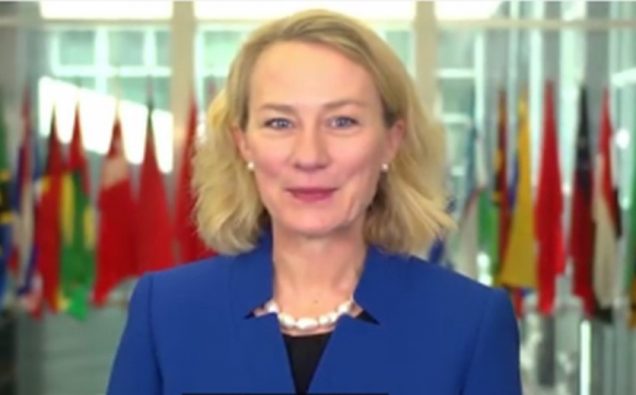
President Donald Trump’s South Asia strategy “focuses on reducing tensions between Pakistan and India” and Washington urges the two countries to revive their dialogue at the earliest, a senior American diplomat said.
“The United States does not seek a role as a mediator between India and Pakistan, but encourages both countries to restart dialogue at the earliest opportunity,” Alice G. Wells Acting Assistant Secretary for South and Central Asia, said.
Appearing before the House Foreign Affairs Subcommittees for the Middle East and North Africa, and Asia and the Pacific, Ambassador Wells emphasized that, “an improved relationship between these two countries is critical to regional security and stability.”
“We are increasingly concerned about the threat to strategic stability in South Asia associated with the introduction of new nuclear capable ballistic or cruise missile systems in the region.
“In particular, the region and the world looks to both Pakistan and India to safeguard against a nuclear conflict in South Asia.”
In this context, she said, the United States remains concerned about Pakistan’s growing fissile material stockpiles and its expanding and diversifying military nuclear and missile programs.
“With India, we value the role the country can play in global security and stability as part of our shared vision of a free and open Indo-Pacific region. We also want to work with India to counter terrorist threats. And we see significant economic and business opportunities in both countries that we intend to explore for the benefit of all of our citizens.
“We see the issues facing these countries as inextricably linked. A South Asia that is secure, stable, and prosperous requires cooperation and progress on a range of issues across the region. We will vigorously pursue international and regional efforts to build broad support among the region to increase pressure on the Taliban to come to the negotiating table.”
The U.S. officials spelled out the Trump Administration’s policy toward Pakistan, Afghanistan and India during the testimony, chaired by Congresswoman Ros-Lehtinen.
Here is Ambassador Wells’ opening statement on Pakistan’s role and the U.S.-Pakistan relations:
“Pakistan is important to the success of the strategy. The President and the Secretary have been very clear that the trajectory of our relationship with Pakistan, including U.S. security assistance, will depend on how Pakistan responds to our requests for support in implementing our strategy.
During his visit, the Secretary laid out specific expectations of how Pakistan can help create the conditions that will help bring the Taliban to the table.
There is no doubt about Pakistan’s significant sacrifices and contributions in fighting terrorism; Pakistan has fought against militants intent on undermining the Pakistani state at the cost of over 70,000 soldiers’ and civilians’ lives.
It has been and continues to be an important partner in defeating al-Qa‘ida and ISIS in South Asia.
Our new South Asia strategy presents Pakistan with an opportunity. As the Secretary said to Pakistan’s Prime Minister and Chief of Army Staff, “We have a long history of positive partnership with Pakistan. But Pakistan must do more to eradicate militants and terrorists operating within its country. The people of Pakistan have much to gain from a stable, peaceful Afghanistan, and a region that denies safe haven to terrorists.”
This fact has driven the President’s approach, in which we ask Pakistan to take decisive action against all terrorists without discrimination, and not just selective actions against groups that carry out attacksin Pakistan.
No partnership can survive a country’s tolerance of militants and terrorists who are targeting U.S. service members and officials. Furthermore, Afghanistan reasonably asks that the Taliban insurgents be forced to fight on Afghan soil, without recourse to safe haven or respite, and regeneration inneighboring states.
We are prepared to work constructively with Pakistan to move against these terrorist groups, including the Haqqani Network, Lashkar-e Tayyiba, and Jaish-e Mohammed.
Pakistan has said it shares our goal for a peaceful and stable Afghanistan and seeks a strong relationship with the United States. We look to Pakistan to create the conditions that will help bring the Taliban to the negotiating table.
Towards this end, the Secretary stressed the importance of the government of Pakistan denying safe haven to the Taliban, including the Haqqani Network.
Our approach to implementing the South Asia strategy will be informed by Pakistan’s actions.
“When the United States and Pakistan work in concert, we can achieve significant results. As the President noted, our militaries have cooperated closely and effectively against common enemies.
“Pakistan facilitates logistical support for NATO operations in Afghanistan. Additionally, the Pakistan Navy is second only to the United States in its longstanding participation in U.S.-led Combined Maritime Forces in the Arabian Sea, focused on maritime security and counterpiracy.
Beyond security issues, with a population of over 200 million and a growing, entrepreneurial middle class, Pakistan presents promising opportunities for U.S. businesses.
But we remain concerned about the stability and security of the region, andof Pakistan itself. As long as certain terrorist organizations continue to operate and build their capabilities within Pakistan’s borders, they pose a threat to Pakistan’s own stability, as well as to the security of American citizens and service members in the region.
It is in neither our interest nor Pakistan’s that Pakistan be destabilized. And so we have a mutually shared interest in not just containing these organizations, but ultimately eliminating them.
We strongly encourage Pakistan to align its military and diplomatic efforts to disrupt the Taliban’s operations and infrastructure, and to prioritize their constructive engagement in peace negotiations. Pakistan has much to gain by expanding their cooperation with us, and much to lose if they do not.”

















